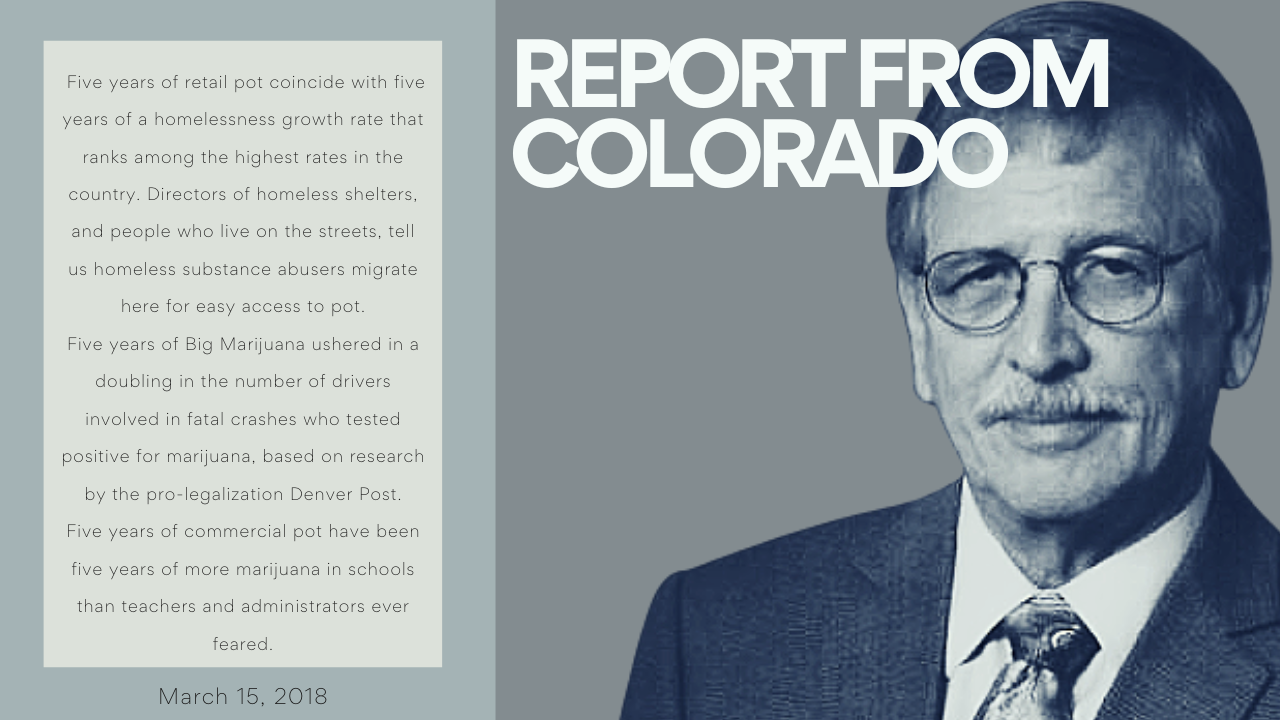Posted on November 17, 2022 View all news
Joe Tilton
March 15, 2018
The following is an article from the Colorado Springs Gazette opinion page. The plan for this week was to write another article about marihuana, yet this one may be the most telling of all. This one is titled, “Five Years Later, Colorado sees Toll.” A local comment follows.
*****
Last week marked the fifth anniversary of Colorado’s decision to sanction the world’s first anything-goes commercial pot trade.
Five years later, we remain an embarrassing cautionary tale.
Visitors to Colorado remark about a new agricultural smell, the wafting odor of pot as they drive near warehouse grow operations along Denver freeways. Residential neighborhoods throughout Colorado Springs reek of marijuana, as producers fill rental homes with plants.
Five years of retail pot coincide with five years of a homelessness growth rate that ranks among the highest rates in the country. Directors of homeless shelters, and people who live on the streets, tell us homeless substance abusers migrate here for easy access to pot.
Five years of Big Marijuana ushered in a doubling in the number of drivers involved in fatal crashes who tested positive for marijuana, based on research by the pro-legalization Denver Post.
Five years of commercial pot have been five years of more marijuana in schools than teachers and administrators ever feared.
“An investigation by Education News Colorado, Solutions and the I-News Network shows drug violations reported by Colorado’s K-12 schools have increased 45 percent in the past four years, even as the combined number of all other violations has fallen,” explains an expose on escalating pot use in schools by Rocky Mountain PBS in late 2016.
The investigation found an increase in high school drug violations of 71 percent since legalization. School suspensions for drugs increased 45 percent.
The National Survey on Drug Use and Health found Colorado ranks first in the country for marijuana use among teens, scoring well above the national average.
The only good news to celebrate on this anniversary is the dawn of another organization to push back against Big Marijuana’s threat to kids, teens and young adults.
The Marijuana Accountability Coalition formed Nov. 6 in Denver and will establish satellites throughout the state. It resulted from discussions among recovery professionals, parents, physicians and others concerned with the long-term effects of a commercial industry profiteering off of substance abuse.
“It’s one thing to decriminalize marijuana, it’s an entirely different thing to legalize an industry that has commercialized a drug that is devastating our kids and devastating whole communities,” said coalition founder Justin Luke Riley. “Coloradans need to know, other states need to know, that Colorado is suffering from massive normalization and commercialization of this drug which has resulted in Colorado being the number one state for youth drug use in the country. Kids are being expelled at higher rates, and more road deaths tied to pot have resulted since legalization.” Commercial pot’s five-year anniversary is an odious occasion for those who want safer streets, healthier kids and less suffering associated with substance abuse. Experts say the worst effects of widespread pot use will culminate over decades. If so, we can only imagine the somber nature of Big Marijuana’s 25th birthday.
-Colorado Springs Gazette
Published November 14, 2017
*****
In 1979, a song shot up the music charts called, “What a Fool Believes.” A line too often lost to the rhythm is, “No wise man has the power to reason away what seems to be.” We are becoming a nation with fixed attitudes based on what we believe about mind-altering substances. Marihuana is now in that list. For so long it has been said that this is a harmless drug that will cure cancer. We must not just “believe” that, but prove it so the benefits will be verified to outweigh the cost to society. Proponents say they have proof through testimony. Still, prove it. Even if it’s proven to be medically beneficial, what does that have to do with “recreational” use?

